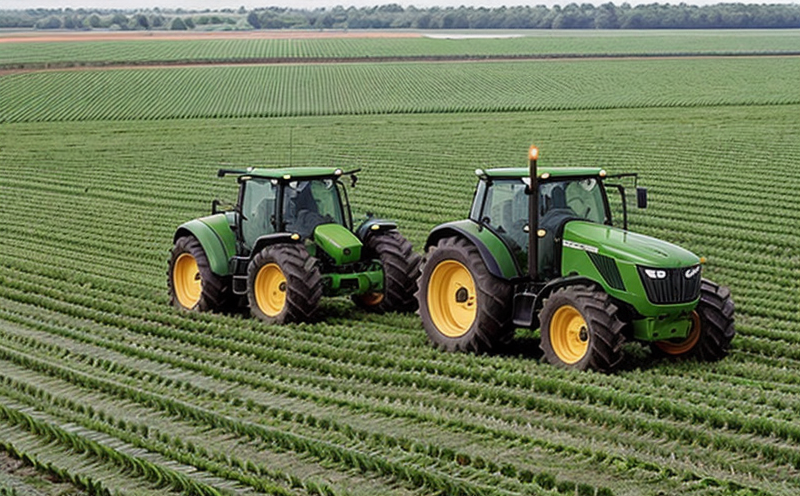
-
Agricultural Equipment Certification-
Innovation in Agricultural Equipment Certification-
New Trends in Agricultural Machinery Sustainability Certification
We provide comprehensive solutions designed to help our clients mitigate risks, enhance performance, and excel in key areas such as quality, health & safety, environmental sustainability, and social responsibility.
Discover
For many years, our organization has been operating successfully, boasting modern laboratories that meet international standards. These laboratories are equipped with the latest technology devices and equipment, and we have built a strong team of experienced and trained personnel to operate them.
DiscoverWelcome to Eurolab, your partner in pioneering solutions that encompass every facet of life. We are committed to delivering comprehensive Assurance, Testing, Inspection, and Certification services, empowering our global clientele with the ultimate confidence in their products and processes.
Discover
-
Agricultural Equipment Certification-
Innovation in Agricultural Equipment Certification-
New Trends in Agricultural Machinery Sustainability CertificationNew Trends in Agricultural Machinery Sustainability Certification
The agricultural industry is one of the most significant contributors to greenhouse gas emissions worldwide. With the growing awareness of environmental concerns and climate change, there has been an increasing focus on sustainable agriculture practices and machinery. One way to promote sustainability in agriculture is through certification programs that assess the environmental impact of agricultural machinery.
Sustainability certification for agricultural machinery has become a crucial aspect of modern farming practices. It ensures that farmers and manufacturers prioritize environmentally friendly technologies and reduce their carbon footprint. This trend has gained momentum over the past decade, with various organizations launching initiatives to promote sustainable agriculture. In this article, we will explore new trends in agricultural machinery sustainability certification.
What is Sustainability Certification?
Sustainability certification for agricultural machinery evaluates a products environmental impact across its entire lifecycle. It assesses factors such as energy consumption, emissions, resource usage, and waste management during production, transportation, use, and disposal. This evaluation process provides an objective measurement of the products sustainability performance.
Types of Sustainability Certifications:
Several organizations offer sustainability certifications for agricultural machinery:
European Machinery Initiative (EMI): EMI certifies machinery under its Blue Angel label, which evaluates energy efficiency and environmental performance.
US EPAs Safer Choice: This program assesses the safety and environmental impact of products, including agricultural machinery.
ISO 14024: An international standard for evaluating environmental claims, including those related to sustainability certification.
Key Benefits:
Sustainability certifications have numerous benefits for manufacturers, farmers, and the environment:
Increased efficiency: Certified machines often incorporate energy-saving technologies, reducing operating costs and emissions.
Enhanced brand reputation: Manufacturers can demonstrate their commitment to sustainability through certifications.
Compliance with regulations: Many countries enforce environmental regulations; certification ensures compliance and avoids potential fines.
Market differentiation: Certified products can command higher prices due to their association with environmental responsibility.
New Trends in Sustainability Certification:
Some notable trends have emerged in the field of agricultural machinery sustainability certification:

Food Safety and Testing
Food Safety and Testing: Ensuring the Quality of Our Food As consumers, we expect our food to be sa...

Industrial Equipment Certification
Industrial equipment certification is a critical process that ensures industrial equipment meets spe...

Automotive Compliance and Certification
Automotive Compliance and Certification: Ensuring Safety and Efficiency The automotive industry is ...

Agricultural Equipment Certification
Agricultural equipment certification is a process that ensures agricultural machinery meets specific...

Electrical and Electromagnetic Testing
Electrical and Electromagnetic Testing: A Comprehensive Guide Introduction Electrical and electrom...

Transportation and Logistics Certification
Transportation and Logistics Certification: A Comprehensive Guide The transportation and logistics ...

Electromechanical Safety Certification
Electromechanical Safety Certification: Ensuring Compliance and Protecting Lives In todays intercon...

Environmental Impact Assessment
Environmental Impact Assessment: A Comprehensive Guide Environmental Impact Assessment (EIA) is a c...

Healthcare and Medical Devices
The Evolution of Healthcare and Medical Devices: Trends, Innovations, and Challenges The healthcare...

IT and Data Center Certification
IT and Data Center Certification: Understanding the Importance and Benefits The field of Informatio...

Pressure Vessels and Installations Testing
Pressure Vessels and Installations Testing Pressure vessels are a critical component of various ind...

Construction and Engineering Compliance
Construction and Engineering Compliance: Ensuring Safety, Quality, and Regulatory Adherence In the ...

Lighting and Optical Device Testing
Lighting and Optical Device Testing: Ensuring Performance and Safety Lighting and optical devices a...

Pharmaceutical Compliance
Pharmaceutical compliance refers to the adherence of pharmaceutical companies and organizations to l...

Military Equipment Standards
Military Equipment Standards: Ensuring Effectiveness and Safety The use of military equipment is a ...

Hospitality and Tourism Certification
Hospitality and Tourism Certification: Unlocking Opportunities in the Industry The hospitality and ...

Consumer Product Safety
Consumer Product Safety: Protecting Consumers from Harmful Products As a consumer, you have the rig...

Energy and Sustainability Standards
In today’s rapidly evolving world, businesses face increasing pressure to meet global energy a...

Product and Retail Standards
Product and Retail Standards: Ensuring Quality and Safety for Consumers In todays competitive marke...

NEBS and Telecommunication Standards
Network Equipment Building System (NEBS) and Telecommunication Standards The Network Equipment Bu...

Chemical Safety and Certification
Chemical safety and certification are critical in ensuring the safe management of products and proce...

Battery Testing and Safety
Battery Testing and Safety: A Comprehensive Guide As technology continues to advance, battery-power...

Cosmetic Product Testing
The Complex World of Cosmetic Product Testing The cosmetics industry is a multi-billion-dollar ma...

Railway Industry Compliance
Railway Industry Compliance: Ensuring Safety and Efficiency The railway industry is a critical comp...

MDR Testing and Compliance
MDR Testing and Compliance: A Comprehensive Guide The Medical Device Regulation (MDR) is a comprehe...

Renewable Energy Testing and Standards
Renewable Energy Testing and Standards: Ensuring a Sustainable Future The world is rapidly transiti...

Aviation and Aerospace Testing
Aviation and Aerospace Testing: Ensuring Safety and Efficiency The aviation and aerospace industr...

Environmental Simulation Testing
Environmental Simulation Testing: A Comprehensive Guide In todays world, where technology is rapidl...

Fire Safety and Prevention Standards
Fire Safety and Prevention Standards: Protecting Lives and Property Fire safety and prevention stan...

Trade and Government Regulations
Trade and government regulations play a vital role in shaping the global economy. These regulations ...